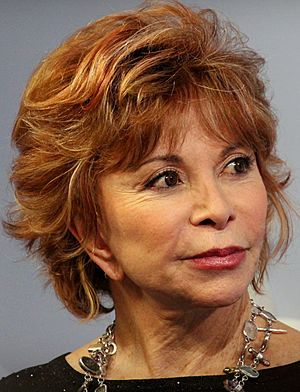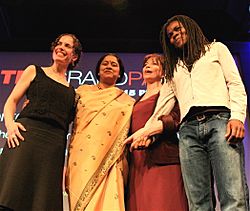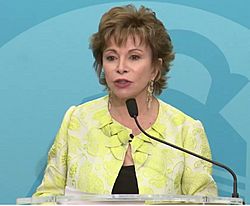Isabel Allende facts for kids
Quick facts for kids
Isabel Allende
|
|
|---|---|

Allende in Germany, 2015
|
|
| Born | Isabel Angélica Allende Llona 2 August 1942 Lima, Peru |
| Occupation |
|
| Language | Spanish |
| Citizenship |
|
| Notable awards |
|
| Spouses |
Miguel Frías
(m. 1962; div. 1987)William C. Gordon
(m. 1988; div. 2015)Roger Cukras
(m. 2019) |
| Children | Paula Frías Allende Nicolás Frías Allende |
| Relatives | Allende family |
| Signature | |
 |
|
Isabel Angélica Allende Llona (born August 2, 1942) is a famous Chilean-American writer. She is known for her novels that often mix real life with fantasy. This style is called magical realism.
Her most famous books include The House of the Spirits and City of the Beasts. Many people consider her the world's most widely read Spanish-language author. Her books have sold millions of copies and have been translated into many languages.
In 2010, she received Chile's National Literature Prize. In 2014, U.S. President Barack Obama awarded her the Presidential Medal of Freedom. Allende became a U.S. citizen in 1993 and has lived in California since 1989.
Contents
Early Life and Family
Isabel Allende was born in Lima, Peru. Her father, Tomás Allende, was a Chilean diplomat. He was also the first cousin of Salvador Allende, who later became the president of Chile.
In 1945, Isabel's mother moved with her children to Santiago, Chile. Later, her mother remarried a diplomat named Ramón Huidobro. Because of his job, the family moved to different countries. Isabel lived in Bolivia and Lebanon, where she attended American and British schools. This helped her learn English. The family returned to Chile in 1958. As a young girl, she loved to read, especially the plays of William Shakespeare.
Career as a Writer
Working in Journalism
Before she became a famous novelist, Allende worked as a journalist. From 1959 to 1965, she worked for the United Nations in Santiago and in Europe.
She also had a job translating romance novels from English to Spanish. She was let go for changing the stories to make the female characters sound smarter and more independent.
From 1967, she worked for Paula, a magazine for women. She also became the editor of a children's magazine called Mampato. As a journalist, she once interviewed the famous poet Pablo Neruda. He told her she had too much imagination for journalism and should write novels instead.
Moving to Venezuela
In 1973, a military group led by General Augusto Pinochet took over the government in Chile. Because her family was connected to the former president, it became unsafe for her. She helped many people escape the country.
Soon, she also had to leave for her own safety. She moved to Venezuela and lived there for 13 years. She has said that leaving Chile is what made her a serious writer. In Venezuela, she worked as a journalist for a major newspaper.
Becoming a Famous Author
In 1981, while in Venezuela, Allende learned that her 99-year-old grandfather was very ill. She started writing him a long letter. That letter turned into her first novel, The House of the Spirits, which was published in 1982.
The book became a huge success. It was published in many languages all over the world. This book helped make her famous as an author who uses magical realism.
Allende has a strict writing routine. She starts every new book on January 8th. She says this tradition began with the letter to her grandfather.
Personal Life and Foundation
Allende married her first husband, Miguel Frías, in 1962. They had two children, a daughter named Paula and a son named Nicolás. They later divorced. She married her second husband, William C. Gordon, in 1988. They separated in 2015. In 2019, she married her third husband, Roger Cukras.
In 1992, her daughter Paula died at the age of 29 from a rare disease. To honor her daughter, Allende wrote a book called Paula (1995). It is a memoir about her childhood and her family's experiences.
In 1996, Allende started the Isabel Allende Foundation. The foundation works to support and protect the rights of women and children.
Major Awards and Honors
Isabel Allende has received many awards for her work.
- National Prize for Literature (Chile, 2010): This is Chile's most important literary award.
- Presidential Medal of Freedom (United States, 2014): This is one of the highest awards a civilian can receive in the U.S.
- Hans Christian Andersen Literature Award (Denmark, 2012): An international award for writers whose work is similar to Andersen's.
- BBC 100 Women (2018): She was named one of the 100 most inspiring and influential women in the world by the BBC.
Selected Books by Isabel Allende
Fiction
- The House of the Spirits (1982)
- Of Love and Shadows (1985)
- Eva Luna (1987)
- Daughter of Fortune (1999)
- City of the Beasts (2002)
- Zorro (2005)
- Ines of My Soul (2006)
- Island Beneath the Sea (2010)
- The Japanese Lover (2015)
- A Long Petal of the Sea (2019)
- Violeta (2022)
Nonfiction (Memoirs)
- Paula (1994)
- My Invented Country: A Memoir (2003)
- The Sum of Our Days (2007)
- The Soul of a Woman (2021)
See also
 In Spanish: Isabel Allende para niños
In Spanish: Isabel Allende para niños
 | Percy Lavon Julian |
 | Katherine Johnson |
 | George Washington Carver |
 | Annie Easley |



